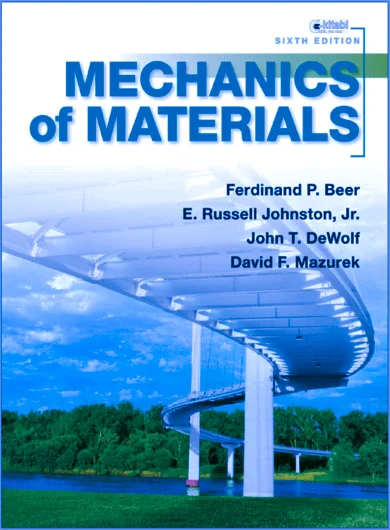Mechanics of Materials 6th Edition by Beer and Johnston’s- PDF

Mechanics of Materials is a fundamental branch of engineering that delves into the study of how solid objects respond to various forces and stresses. At its core, this discipline examines the internal behavior of materials under the influence of external loads, providing crucial insights that enable engineers to design structures, machines, and components that can withstand the rigors of real-world applications. By analyzing the relationships between stress, strain, and deformation, Mechanics of Materials equips practitioners with the tools to predict how a given material will perform under specific loading conditions, be it tension, compression, torsion, or bending.
This knowledge is indispensable when it comes to selecting the appropriate materials and dimensions for everything from bridges and buildings to automotive parts and aerospace components. The field draws upon a rich tapestry of scientific principles, from the properties of crystalline structures to the complex interplay of elasticity, plasticity, and fracture mechanics. Through a combination of theoretical analysis, empirical testing, and computational modeling, Mechanics of Materials empowers engineers to push the boundaries of innovation, crafting designs that balance safety, efficiency, and cost-effectiveness. Whether designing a skyscraper to withstand earthquakes or optimizing the suspension system of a high-performance vehicle, the insights gleaned from this discipline are indispensable to the modern world, underpinning the very infrastructure and technologies that shape our daily lives.
Examples and Sample Problems
The theory section includes a number of examples designed to illustrate and facilitate understanding of the material being presented. The examples are intended to demonstrate some of the applications of the theory to engineering problem-solving. Because they are set in much the same format that students will use in solving a given problem, the sample problems serve the dual purpose of amplifying the text and demonstrating the type of orderly work that students should cultivate in their own solutions.
Fundamentals of Engineering Examination
Engineers seeking to become a Professional Engineer must take two exams. The first exam, the Fundamentals of Engineering Examination, includes the subject matter of Mechanics of Materials. Appendix E lists the Mechanics of Materials topics covered in this exam and problems that can be solved to review this material.
About the Book
The main objective of the Basic Mechanics course is to equip engineering students with the ability to analyze a given problem in a simple and logical manner and to apply some basic and well-understood principles to its solution. This book was prepared to provide a first course in mechanics of materials or strength of materials for sophomore or junior engineering students. The authors hope that this book will help instructors achieve this goal in that particular course in the same way that other texts have been helpful in teaching statics and dynamics.
In this book, the study of mechanics of materials is based on an understanding of some basic concepts and the use of simplified models. This approach allows the necessary formulas to be developed in a rational and logical manner, clearly demonstrating conditions that can be safely applied to the analysis and design of actual engineering structures and mechanical components.
Beer and Johnston’s Mechanics of Materials is an unwavering leader in the teaching of solid mechanics. Used by thousands of students worldwide since its publication in 1981, Mechanics of Materials helps students understand and apply the theory and accurately presents the subject matter illustrated with numerous relevant engineering examples.
This tried and tested material gives students the best opportunity to succeed in this course. From the detailed examples to the homework problems to the carefully crafted solutions manual, you and your students can be confident that the material is clearly explained and accurately presented.


I am interested in the mechanical engineering ebooks